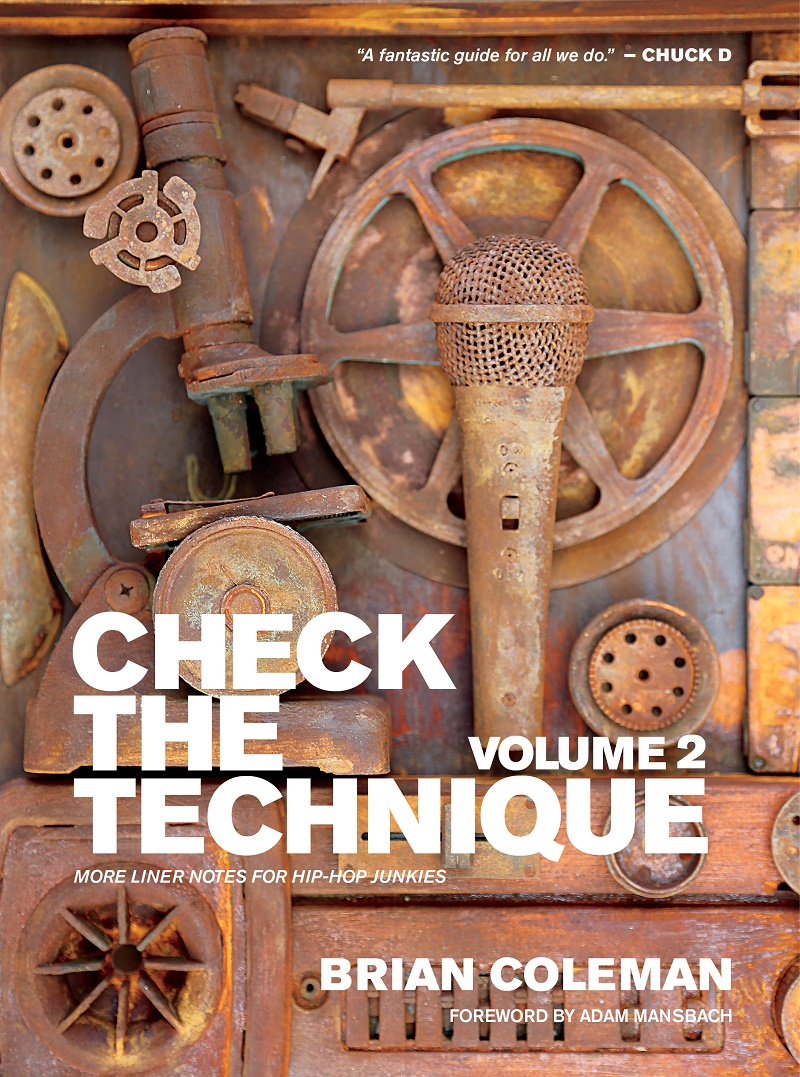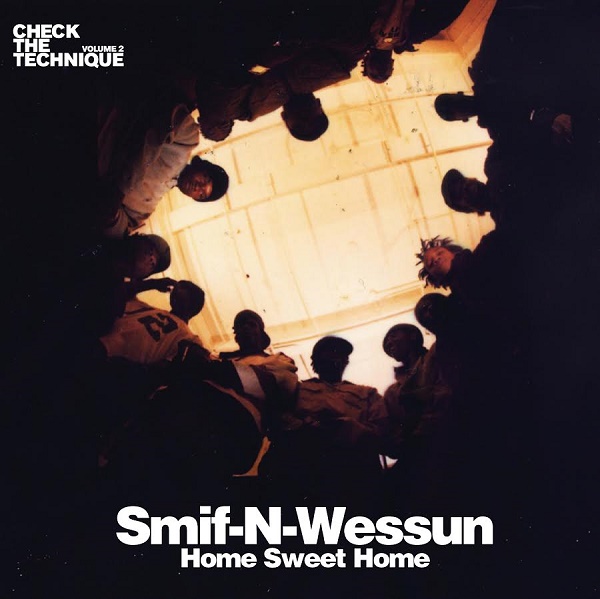Hip-Hop isn’t dead. It isn’t a trend. It’s as much a part of music history as Rock, Classical, or any other major genre. It’s being played in Super Bowl commercials, weddings, and even space (see. will.i.am). But how many people know about the stories and hours upon hours, and hard work that went into the music we all love today? How did Black Sheep come up with “The Choice Is Yours”? What was it like to be in the studio with the Beatnuts? Music journalist, Brian Coleman, is doing his part to chronicle the rich history of Hip-Hop’s greatest music with his books (Check the Technique: Liner Notes for Hip-Hop Junkies (Villard/Random House, 2007; Shinko [Japan], 2008) and Rakim Told Me: Hip-Hop Wax Facts, Straight From the Original Artists. The ‘80s (Wax Facts Press, 2005).) And now he’s released the sequel to the first Check the Technique. Not only does he interview the artists like Ice Cube, 3rd Bass, MF DOOM, Naughty By Nature, Lord Finesse, and Talib Kweli, he breaks down each track on the albums he analyzes to get all of the personal stories. And if Questlove likes the book, you can bet it’s legit. Here’s a breakdown of the table of contents:
3rd Bass The Cactus Album
The Beatnuts Intoxicated Demons: The EP
Black Sheep A Wolf In Sheep’s Clothing
Company Flow Funcrusher Plus
The Coup Steal This Album
Diamond and the Psychotic Neurotics Stunts, Blunts & Hip Hop
DJ Jazzy Jeff & The Fresh Prince He’s The DJ, I’m The Rapper
Dr. Octagon Dr. Octagonecologyst
ED O.G & Da Bulldogs Life Of A Kid In The Ghetto
Gravediggaz Niggamortis [aka 6 Feet Deep]
Ice Cube AmeriKKKa’s Most Wanted & Kill At Will
Jeru The Damaja The Sun Rises In The East
KMD Black Bastards
Kool G Rap & DJ Polo Wanted: Dead Or Alive
Kwamé The Boy Genius Featuring A New Beginning
Lord Finesse & DJ Mike Smooth Funky Technician
Mantronix The Album
Masta Ace Incorporated SlaughtaHouse
Mos Def & Talib Kweli Are Black Star
Naughty By Nature Naughty By Nature
Nice & Smooth Ain’t A Damn Thing Changed
[Chef] Raekwon Only Built 4 Cuban Linx…
Smif-N-Wessun Dah Shinin’
Stetsasonic In Full Gear
Various Wild Style Breakbeats
Check out our interview with Mr. Coleman below. You can buy your autographed copy HERE (USA), regular copy HERE (North America), Apple E-Book HERE, and Kindle book HERE. If you live in the UK, head HERE for a hard copy and for the rest of Europe, head HERE.
Which was your favorite album to cover or interview you conducted?
It’s not easy to choose, but I would say the album that was most satisfying for me to cover this time was probably Stetsasonic’s In Full Gear, because I have always felt that they are criminally underrated and I have always been such a huge fan. They were unique and powerful on every level and Daddy-O is also constantly overlooked as an MC and writer. As for specific interviews I enjoyed, it’s pretty tough to top Kool Keith, and this was the second time I have featured a project of his in one of my books (Ultramagnetic MCs from my first book Rakim Told Me – that chapter is also included as a bonus in this new book’s Ebook; and also Dr. Octagon this time around).
Now that this is your third edition of the CTT/RTM series, what was something you learned from the previous editions to help you prepare for this one?
I think that being an effective interviewer is a skill that you constantly get better at over time. I’m still learning, even after interviewing people for almost two decades. The better you are, the better and deeper information you get from your interview subjects. I’m still learning, and still improving as time goes on. If you ever think you can’t get any better as an interviewer or a writer, then you are wrong.
What were the toughest interviews or albums to complete?
I don’t think any of them were tougher than any others. Some of the artists who aren’t current superstars can be a pain to get on the phone, and at the same time Ice Cube – who is about as big of a star as you can get – appreciated what I was doing with my books and was very generous with his time (when he certainly had better things to do). Each interview and chapter presents its own set of challenges, and that makes me feel that much better once they are done.
Were there any disappointments or surprises along the way?
There are almost as many disappointments as accomplishments when it comes to these books, but I start out with a lot of options, knowing that many of them won’t come through. In the end, I’m very happy with the way that all of my books have turned out, so I never fixate on the “what could have been” situations.
How do you explain the serious lack of literature and analysis of Hip-Hop as a culture? How do you see blogs fitting into the written history of it all?
I would disagree that there is a lack of literature and analysis about hip-hop. There are a lot of amazing books that have been written since the early ‘80s, even if some of them aren’t still in print. People just have to dig a bit. There is a lot of writing about hip-hop being done these days, and it’s true that not all of it is great. But back in the early 1990s it wasn’t all great either. I think that blogs are doing a great job of digging deep with a lot of great, underrated artists. Back in the days when print magazines were the only game in town, the big problem was that you only had so much column space to give an artist who wasn’t going to drive newsstand sales. Blogs don’t have that same problem. So I love all the longer pieces and interviews that are being done. Hopefully some of that work will someday translate into actual printed books – I don’t see books ever dying. Ebooks still haven’t taken over the publishing world and there’s a reason for that. It’s just a different feeling when you have a book in your hand instead of reading it on the screen, just like having a vinyl album is better than an MP3. It might be more convenient, but sometimes convenience leaves you wanting more.
What was your interview process like for groups or multiple people? Having them in a room together or separate? Why?
I generally like to speak with artists solo, even if they are part of a group. You can build on what one of them says and expand it with the next artist in line – sometimes that’s a great way to open up an entirely new avenue that you hadn’t anticipated when you first started your research. I don’t mind doing group interviews, but it’s always easier to do them one-on-one. It’s a more intimate, less guarded way to have a conversation either way.
It seems like a common theme in a lot of these stories is that everyone knew everyone back then. I feel like a lot of that has changed in today’s industry. What do you think attributes to that? The internet, fake relationships, the nature of corporate America?
That’s a great question and I agree – in the late ‘80s into the 1990s, I think a lot of artists did feel more camaraderie with each other, even if they were competing for shelf space in record stores. It was friendly competition, everyone was trying to out-dope the next person. It had nothing to do with sales, it was about art and innovation. One of the big reasons for that lack of camaraderie today is that it’s a lot easier to set up a recording situation at home, so there aren’t disparate artists gathering at a central spot, like a recording studio (D & D, Calliope, Greene Street, Chung King). It’s the same thing with record stores and even radio shows back then – they were central places that people gathered and shared ideas and hatched new ideas. Today it’s too easy to email someone an MP3 of a track, so it’s not like “come over tonight and hear this new stuff I’m working on.” I don’t think anything about the current state of hip-hop recording is a good thing from an artistic perspective, except that it’s easier for younger artists to be able to record. You just can’t replicate how people bond and grow when you’re sharing bad Chinese food at 3 a.m. during a marathon session. I don’t think that corporate America is any more evil now than it was back in the ‘80s and ‘90s, so I’m not sure that really factors into it.
Would you do anything differently if you had to redo these books?
I would win the lottery, so I didn’t have to pay to print them up on my own! Otherwise, I have no regrets, especially with my new book. I think it turned out really well, I’m very proud of it. People are always surprised when they learn that it’s self-published, and I take a lot of pride in that. I also own the book 100% and have full control. That feels great.
Why did you pick Smif-N-Wessun’s “Home Sweet Home” as the 45?
There are a bunch of reasons for that. First off, I have always had a big place in my hip-hop heart for the Beatminerz / Boot Camp / Duck Down crew. Evil Dee and Mr. Walt are some of my favorite dudes in the world, they have always been incredibly helpful with what I’m doing in my books. Secondly, General Steele was really helpful with the Dah Shinin’ chapter I did in the new book, and very enthusiastic to be a part of what I’m doing, which I really appreciated. He gave me a bunch of amazing images from his personal collection to use, including the one I used on the cover of the (promo-only) 45. That was a “test shot” taken by photographer Gary Spector right before they took the final cover photo. And finally, there’s so much Brooklyn in that song, and that’s what Smif-N-Wessun are all about: Bucktown. The song samples a Roy Ayers Ubiquity song called “We Live In Brooklyn Baby” and the album cover of Dah Shinin’ is also a tribute to the Roy Ayers album that the sample comes from (He’s Coming). So it all just came together. With my chapters, they are all about layers – you dive deeper and deeper with every page, and learn more about these artists.
What’s next for you?
I’m still promoting this current book and will continue to do so for another couple months. And as I mention in the Preface to the book, this is my last volume in this series (after covering 66 albums in my three books). But I definitely hope to write more books. One thing I want to do is to dive really deep with one artist or group, for a truly in-depth collaboration. As for who that might be, I’m not sure yet.
Bryan Hahn wants to be like Brian Coleman when he grows up. He’s on Twitter (@notupstate).


